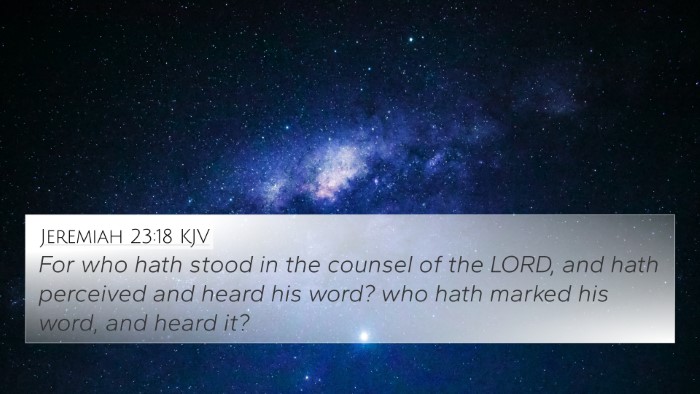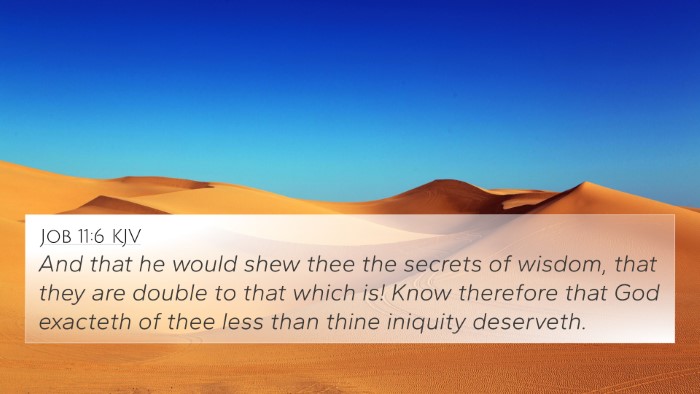Understanding Job 15:8
Job 15:8 reads: "Hast thou heard the secret of God? and dost thou restrain wisdom to thyself?" This verse is a part of Eliphaz's discourse to Job, emphasizing the inadequacy of human understanding in comparison to divine wisdom.
Summary of Insights from Commentaries
This analysis synthesizes insights from several public domain commentaries, including those by Matthew Henry, Albert Barnes, and Adam Clarke.
Verse Context
In this chapter, Eliphaz, one of Job's friends, speaks to him with a tone of rebuke, arguing that Job's suffering must result from sin. He challenges Job's understanding of God's secrets and wisdom, suggesting that Job is unjust in his defense of his integrity.
Key Themes
- Human Limitation vs. Divine Knowledge: Eliphaz implies that only God has complete access to wisdom and insight, which humans cannot fully comprehend.
- Authority of God’s Wisdom: The verse emphasizes that divine wisdom is not meant to be manipulated or kept secret by individuals.
- The Burden of Human Suffering: Eliphaz tends to view suffering through the lens of retribution theology, leading him to misunderstand Job's plight.
Commentary Insights
Matthew Henry
Henry notes that Eliphaz's question serves as an indictment of Job's trust in his own understanding. He suggests that humans often fail to accept the limits of their wisdom.
Albert Barnes
Barnes emphasizes that the “secret of God” refers to His hidden purposes and plans. He believes that Job is accused of trying to bring God down to his own reasoning, which is folly.
Adam Clarke
Clarke points out the rhetorical nature of the question posed by Eliphaz, indicating it serves to highlight the vast difference between divine wisdom and human intellectualism.
Bible Cross-References
This verse finds connections with various other scriptures that enhance its meaning:
- Proverbs 25:2: "It is the glory of God to conceal a thing: but the honour of kings is to search out a matter." - Reflects the hidden nature of God's wisdom.
- Job 11:7-9: "Canst thou by searching find out God? canst thou find out the Almighty unto perfection?" - Emphasizes the idea of seeking God’s wisdom.
- Isaiah 55:8-9: "For my thoughts are not your thoughts, neither are your ways my ways, saith the LORD." - Illustrates the difference between divine and human understanding.
- 1 Corinthians 1:25: "Because the foolishness of God is wiser than men; and the weakness of God is stronger than men." - A New Testament affirmation of God's superior wisdom.
- Romans 11:33: "Oh, the depth of the riches both of the wisdom and knowledge of God!" - This verse provides insight into the unsearchable wisdom of God.
- James 1:5: "If any of you lack wisdom, let him ask of God, that giveth to all men liberally, and upbraideth not; and it shall be given him." - Encourages seeking divine wisdom rather than relying on one's own understanding.
- Psalms 139:6: "Such knowledge is too wonderful for me; it is high; I cannot attain unto it." - Highlights human limitations in grasping God’s knowledge.
Thematic Connections
The theme of divine wisdom versus human folly resonates throughout Scripture, suggesting a continual call for humility in the face of God’s omniscient nature. This theme connects Job’s struggle with God's unexplainable ways, urging the faithful to trust in the Lord's greater understanding.
Cross-Referencing Biblical Texts
Utilizing tools for Bible cross-referencing can deepen the understanding of this verse:
- Utilize a bible concordance to find parallel scriptures that discuss God's wisdom.
- Employ a bible cross-reference guide for finding relationships between the Old and New Testament teachings regarding suffering and wisdom.
- Consider a cross-reference Bible study in group settings to facilitate deeper conversations around this theme.
Conclusion
The inquiry in Job 15:8 poses a reminder of the grandeur of God's wisdom and the insufficiency of human reasoning. Understanding this verse through comparative analysis and thematic connections found in cross-references is essential for a comprehensive grasp of Scripture. As we delve deeper into these Bible verses that relate to each other, we are invited into a greater dialogue within the Word of God, ultimately leading to a richer spiritual experience.



















